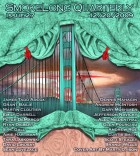I stayed with her until she fell into her winter moods, and her ears burst.
I lit fires, though we did not have a fireplace to speak of, and played songs so that she could hear them, though she could not. I fed the animals she kept close—a hungry dog, an iguana, a small girl, a dog. My father always said, “Listen to the things and such that are smaller than you.” My father was uncompact, lonely. To this day he remains categorically blind. My mother lives off-stage, to the west.
“Will I hear the child?” my wife said. She had learned to project her voice. The dogs immediately barked, and set themselves on some kind of journey.
I’d bet you could safely guess the names of those animals—I won’t ask you to; I don’t belong in large crowds—Stephen, Edward, Galgatua, and Jean-Francois. “Jean Francois,” my wife calls, cupping her ears with the hands that could once praise or tighten, wrap into fists. She flaps the yards of bedspread, searching for some lost remote. “It’s not remotely findable,” I say. I laugh. She laughs even though she cannot hear me.
Winters are all like this. I stack all of our hands—mine, Stephen’s, Edward’s, Galgatua’s, and Jean-Francois—and proclaim them my final wedding gift. We pump them up and down like champions. “That’s all you get,” I tell her. I laugh. I am crying into what I guess are her breasts. Possibly they are elbows tucked very close.
“Will your mother visit me?” my wife said.
“My mother lives way out west,” I said.



 The core workshop of SmokeLong Fitness is all in writing, so you can take part from anywhere at anytime. We are excited about creating a supportive, consistent and structured environment for flash writers to work on their craft in a community. We are thrilled and proud to say that our workshop participants have won, placed, or been listed in every major flash competition. Community works.
The core workshop of SmokeLong Fitness is all in writing, so you can take part from anywhere at anytime. We are excited about creating a supportive, consistent and structured environment for flash writers to work on their craft in a community. We are thrilled and proud to say that our workshop participants have won, placed, or been listed in every major flash competition. Community works.